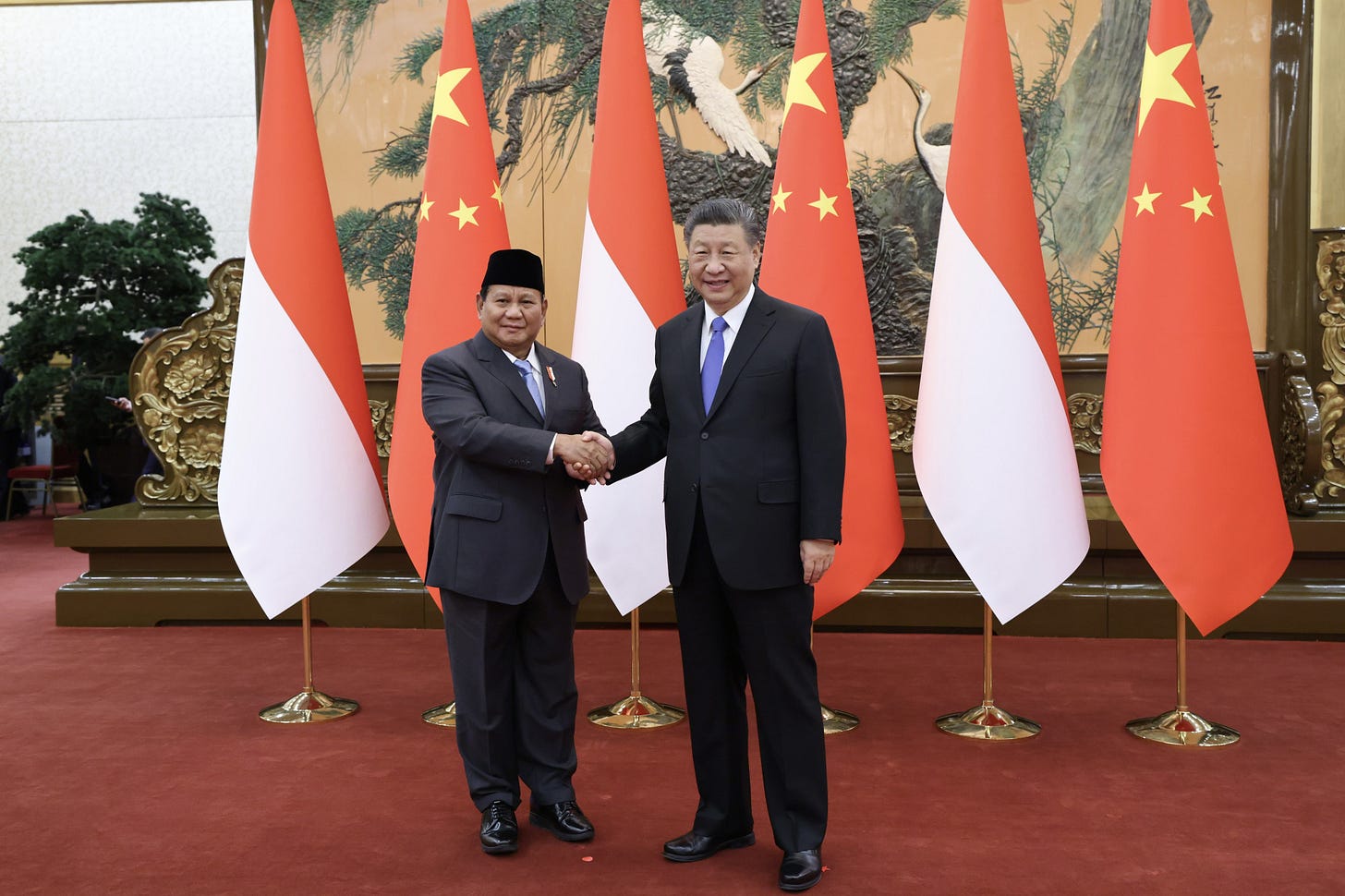What Prabowo China and Japan Stops Reveal on Indonesia Foreign Policy
Rare early engagement signals what to watch in Indonesia's evolving foreign policy under president-elect Prabowo Subianto after February 2024 elections.
Indonesia President-elect Prabowo Subianto’s twin China and Japan trips highlight what to watch in his early foreign policy engagement as shifting post-election dynamics continue to play out in the coming months.
WonkCount: 1647 words (~8 minutes)
What Prabowo China and Japan Stops Reveal on Indonesia Foreign Policy
Background
Prabowo’s twin stops to China and Japan are just the latest sign that he is engaging early abroad despite the dust still settling at home in the world’s fourth-largest country and Southeast Asia’s largest economy. As noted before on ASEAN Wonk, Prabowo, whose victory in Indonesia’s February 14 election was confirmed last month, has long had a reputation for active international engagement. His current defense minister portfolio opened up the possibility of engaging with willing interlocutors in his current capacity even if it is designed to boost his likely presidency not official until the October 2024 inauguration (see a snapshot of select manifestations of this early engagement thus far in the graphic below)1. Indeed, beyond this single tour, even the Indonesian defense ministry’s official count notes that Prabowo’s foreign ambassador engagements alone in just the month of March ran into double digits, alongside other events related to dispatching Palestine assistance, a visit to the new planned capital city as well as events specific to the month of Ramadan2. This is taking place amid a domestic context where Prabowo’s win has been contested by his opponents and speculation continues about the state of ties between Prabowo and outgoing President Joko “Jokowi” Widodo3.
Select Recent Developments in Prabowo’s Early Pre-Inauguration Engagement and Related Events
China and Japan are both logical places for initial visits, despite the early nature of Prabowo’s engagement. Jokowi’s first post-inauguration state visit outside of Southeast Asia was to Japan in March 2015, and a China visit followed4. His first foreign trip after his inauguration was to China, though this was as part of a multilateral stop for APEC and ASEAN, while Jokowi’s reelection saw his first pre-official inauguration trip to Malaysia in August after April polls5. Under Jokowi’s watch, both China and Japan have strengthened their ties with Indonesia such that both are a logical focus of Prabowo’s early diplomacy. Indeed, in some areas like infrastructure in Indonesia, as one official once put it to ASEAN Wonk, it is more appropriate to speak of “China-Japan competition” than “US-China competition.” Under Jokowi, while challenges remain on issues like the South China Sea, China nearly doubled its trade with Indonesia to over $130 billion annually and has emerged as a top investor after struggling to consistently make the top 10 list6. Japan just elevated ties with Indonesia to a comprehensive strategic partnership in a big year for ties with Southeast Asia, cementing its role as a top partner7. Economically, while Japan often gets less credit than China, Japanese firms contribute just short of a tenth of Indonesian GDP and almost a quarter of the country’s exports by one count8.
Significance
Seen from this perspective, Prabowo’s visits provide early indications of the role Japan and China may play in his foreign policy and how early engagement could evolve amid wider regional dynamics. The Japan stop was technically officially announced later than the China stop. But pairing them conveys the appearance of balance to mitigate pro-China perceptions and could increase what one diplomat described to ASEAN Wonk as “the FOMO factor” to catalyze other countries stepping up their early engagement, which in turn reinforces Prabowo’s position9. In both China and Japan, Prabowo engaged with defense counterparts to acknowledge his current position but also met leaders President Xi Jinping and Prime Minister Fumio Kishida under his president-elect title10. This capped off active early engagement on the part of both Beijing and Tokyo since the February election outcome, including by their ambassadors on the ground in Jakarta. The Southeast Asia diplomacy of China and Japan is also in the spotlight this week with Beijing’s hosting of foreign ministers and Tokyo’s upcoming participation in the first U.S.-Japan-Philippine trilateral summit11.
Prabowo’s visits also highlighted some significant areas to watch in terms of the future direction of Indonesia’s ties with China and Japan and his foreign policy approach more generally (see two tables below on areas of note in Jakarta’s ties with both countries, along with a Prospects section on what to watch in the coming months more generally).
Key Areas At Play in Prabowo’s China and Japan Visits and Additional Details (First Table on China; Second Table on Japan)






